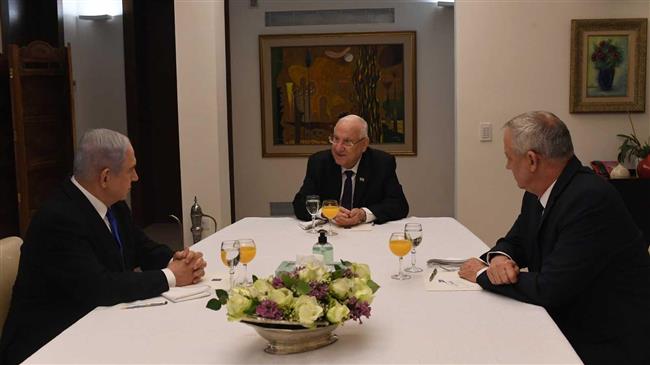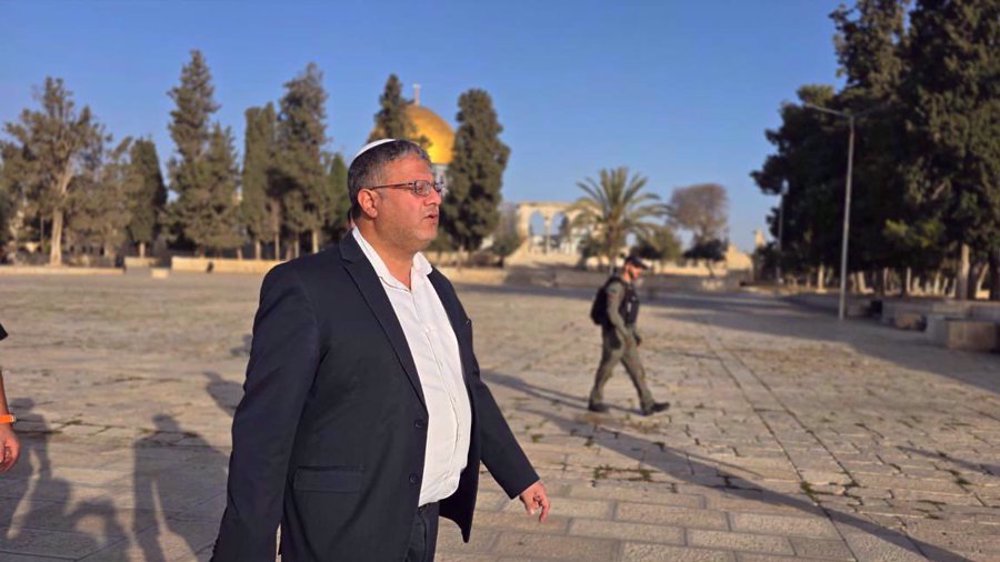Israeli president rejects Gantz's request for more time to form unity government
A months-long political paralysis further persists in the Israeli regime after its President Reuven Rivlin turned down a request by Blue and White chairman Benny Gantz for a two-week extension to form a coalition government.
In a statement on Sunday, the President's Residence said that Rivlin had not granted Gantz, an ex-military chief and the current Knesset speaker, a 14-day extension he requested a day earlier to form a coalition government.
Gantz had argued that the COVID-19 pandemic and the Passover holiday had caused delay in his talks with other parties to form a government.
Last month, the Israeli president gave Gantz a four-week time to reach an agreement with other parties, most notably the right-wing Likud party headed by Prime Minister Benjamin Netanyahu, to form a power sharing government.
Three previous elections– in April and September 2019 and in March this year – tuned out to be inconclusive as no party could secure the necessary 61-seat, in the 120-seat parliament, to form a government. The Netanyahu's bloc only managed to win 59 seats.
Gantz's mandate to form a government will end by midnight Monday, prompting the desperate Knesset speaker to assure Rivlin that he was near an agreement with Netanyahu.
Although Netanyahu has said that he is open to negotiations with Gantz, it does not seem that an agreement between the two on a unity government be on the horizon, as the Israeli president stressed that the two were not close to any agreement.
"The president made his decision after also speaking to ... Netanyahu, who did not confirm in their conversation that the parties are close to signing an agreement that would lead to a unity government," the statement said.
It also said that if Gantz and Netanyahu did not reach an agreement to form a unity government by midnight Monday, "and if the number of recommendations for each candidate does not change, the task of forming the government will return to the Knesset and a period of 21 days will begin during which Knesset members can form a majority to recommend an agreed-on candidate to form a government, who would have 14 days to do so."
Any lawmaker who can secure 61 recommendations would be tasked by the president to form a government. If Knesset members fail to agree on a peer, the regime has to prepare itself for holding yet another election.
As the right-wing religious bloc urged Rivlin on Sunday to tap once again Netanyahu to form a coalition government, a number of public figures petitioned the High Court of Justice in the same day that the Israeli president should not be allowed to task the premier with forming government, citing the three criminal indictments on corruption charges that are pending against Netanyahu.
It seems that Netanyahu intentionally does not reach an agreement with Gantz, hoping that during a fourth election he might secure the parliamentary majority necessary to grant him both a powerful government and immunity from prosecution.
VIDEO | Press TV's news headlines
Over 10,000 people displaced in three days in Sudan: UN agency
Ben-Gvir pushes bill to restrict Muslim call to prayer across occupied Palestine
VIDEO | Muslim leaders convene in Lucknow to discuss community issues
Iran plans further satellite launches in February: Space chief
VIDEO | Bethlehem’s Aida refugee camp playground faces demolition threat
VIDEO | Gaza medical students defy Israeli occupation to resume education
Israel’s recognition of Somaliland 'naked invasion’ of Somalia's sovereignty: President











 This makes it easy to access the Press TV website
This makes it easy to access the Press TV website